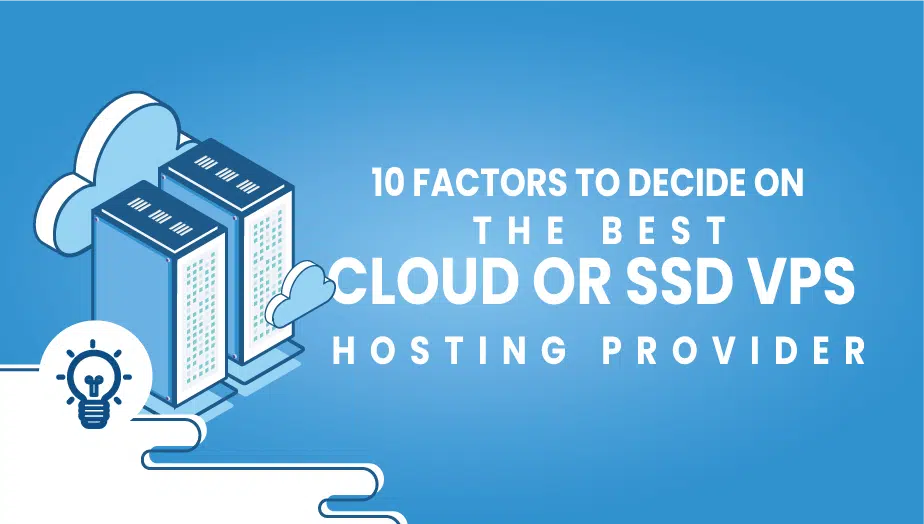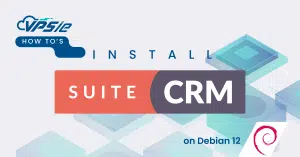10 factors to decide on the best cloud or SSD VPS hosting provider
Selecting the best hosting provider for Webhosting, SSD VPS hosting, or even Cloud hosting is complex; betting on the wrong provider can be costly and frustrating, especially when downtime is involved.

1- Price :
Many web hosting / VPS / cloud searches settle with the cheapest offering. And I must admit that price is the most attractive factor in selecting the hosting provider; however, jumping on the most affordable option mostly doesn’t lead to a happy ending. Add to this if you use your site for e-commerce offerings or as an online store.
I suggest leaving this factor not at the top of your priorities list.
2- Technical specs / Features
Which hosting offers what you need and more? The good idea is to look at your site and evaluate precisely what you need, blog, shopping cart, rich content, and media containers like videos and images; most likely cheap hosting provider won’t effectively help you with any of that due to lack of enough resources, shared RAM, CPU and mostly slow disks. Also, hosting charges for additional services such as backup, snapshots, recovery, etc……….…
You will need good ram and an SSD storage array that delivers good read/write speed.
3- Security
Even if you like it or not, the hosting provider indirectly owns your data; it can be Leaked, Cloned, Published, and even, at worst, LOST.
How safe is your data?, How secure is the network? Most budget providers are a good target for DDoS attacks and phishing attacks and are vulnerable in that way.
Is your data isolated from other clients hosting with the same provider? Can another client use your IP address on their system? If the answer is yes, be happy you are reading this article cause this will only lead to trouble.
Are the hosts compliant with regulations? “PCI, for example,” Credit card details and retention policy? Are they using the legit licenses of any software they offer? “Example, Windows license, cPanel, etc.
Another example: If your provider asks you for your photo ID to verify your order and payment, that’s a good sign. “I know many would disagree”; however, the fact that they demonstrate every order means that they are taking this business seriously and picking a client base to provide service.
4- Tech Support
There is always a debate about how relatively important tech support is; in my opinion, this is number 1 because you can have all the power and speed you need, but once you have an outage, you are dead in the water.
Make the math. How much would 2 hours of downtime cost you? if the answer is $0, then you are more than welcome to stop reading this article and go with the opposite of factor #1.
Better is to look for a hosting provider that has a good track record of good support, as well as positive reviews (real ones), and live support, wins them all since you will always have someone to talk to when an issue occurs (which will happen)
5- Hosting provider client base/target
Not all providers target the same client base, so it’s good to know who they are targeting; for example, if they target developers, it might be possible that their uptime SLA is not their top priority, but features are.
The good idea is to find this out by asking about an area of expertise and how that relates to your needs before you commit.
6- Features
What makes one hosting provider better than the others? As you already know, There are hundreds if not thousands of hosting companies, and they deeply vary on what features are offered and what are the most vital points; for example, if they provide unlimited bandwidth and low latency – then you good to go if you are looking to host a VoIP application…
If they have multiple data centers, they are a great match if you are looking for various locations’ presence and possible replication and offsite backups.
7- The hardware provider is using
That’s the question you must ask, as most information is not clear or visible without some research. If the hardware is an enterprise class, then you are the good cause which means less downtime and no weird, questionable issues.
If the hardware is outdated, you might be facing performance issues. If you are using a specific application, ensure that this hardware is in the supported list “ACL” or compatible with your application.
8- Dashboard/user interface
It’s called Control Panel in many cases. Is it user-friendly? Is it robust? Can you do much there without getting the support team involved?
For example, a hosting provider that allows you to set PTR and RDNS records to your SSD VPS is more desirable than others who don’t care that it may take you hours of waiting to get an entry submitted and then wait for propagation.
9- Scalability
Do you have room to grow? Most likely, sooner or later, your resources needs will increase” it’s just the nature of a successful business” Is your provider able to support you with minimal interruption? Are the upgrade prices acceptable for you to pay one day?
If the answer to those questions is no, Then you are not there yet.
10- Reputation
I mentioned above about looking into your potential hosting provider reviews, and I’m stressing it again here, Cause those reviews are from people who learned the experience the hard way, especially if it’s a negative experience.
Focus on the negative ones, understand the reasoning behind them, and the dates of those reviews; if they are outdated, like 2-3 years old, then they stopped, that might be a good indicator rather than a negative one; it would mean that the provider has issues in the past and was able to overcome it and become more solid and trustworthy.
General notes: BOUNS
- No matter who you go with, keep your access information handy outside of that host’s network.
- Look for your target audience and select a data center location that best serves them.
- Ask all your questions and insist on getting an answer; if you get answers for several questions and missing one solution, ask for it again cause that might be the weakest point, so better to be aware of it before it’s too late.
- Do some reading on datacenters tiers and always pick providers who host in Tier 3+ datacenter.
- Educate yourself on your platform and never depend on managed service if you take that business seriously.
- Ask about the IP you will be getting and check it against the blocked database; if it’s there, that might indicate the hosting provider’s quality, especially if you have email-related services.
- Price is often a misleading indicator; avoid too good-to-be-actual deals and specials.
- Call provider support after hours; if there is no answer or a paid managed-to-answer service responds, that might be precisely the same when your site is down after hours.
- Watch for your payment receipt. Is it the same company name you intended to send the payment to? If not, then why it’s different?
- Watch for resellers who take other services and mark them up without adding value – they might be just smart enough to find a plugin that integrates with their platform to sell you and some SEO-working technique to deliver their message to you.
- A good provider might ask you about your business, What do you sell? Are you legally selling what you are selling? Those are all good indicators, NOT the opposite.
- Check the rank; if their site is fast and highly ranked, That might be a good indicator that they have many clients and visibility in the market.
I will update this post based on more thoughts I can develop. Hopefully, this can help a bit in the challenging task of finding the right hosting provider.
VPS (Virtual Private Server) hosting is which a type of web hosting where a material server is partitioned into many virtual servers, each operating independently. It is an affordable and flexible solution that offers more control, resources, and security than shared hosting.
Cloud hosting is a type of web hosting that uses a interconnected system/structure of servers to distribute resources and workload among several virtual machines. It is designed to provide reliable, scalable, and flexible hosting services that Somebody can easily be customized to meet the needs of individual users.
SSD (Solid State Drive) hosting is a type of web hosting that uses solid-state drives instead of traditional spinning hard drives to store data. SSD hosting provides faster website load times, improved performance, and better reliability than traditional hard drive hosting.
Some key factors to consider when selecting a cloud or SSD VPS hosting provider include uptime and reliability, security, scalability, performance, customer support, and pricing.
You can determine the uptime and reliability of a hosting provider by checking their service level agreement (SLA), reading reviews and testimonials from current and past customers, and looking for independent third-party monitoring and certification.
Look for hosting providers that offer advanced security features like DDoS protection, SSL certificates, firewalls, intrusion detection and prevention, and regular backups.
You can determine the uptime and reliability of a hosting provider by checking their service level agreement (SLA), reading reviews and testimonials from current and past customers, and looking for independent third-party monitoring and certification.
Some key performance benchmarks are website load times, server response times, and page speed scores. Look for hosting providers that offer fast and reliable performance.
Customer support is critical when selecting a hosting provider, as technical issues can arise anytime. Look for providers that offer 24/7 support via phone, chat, or email.
Look for hosting providers that offer transparent pricing with no hidden fees and a range of pricing plans to suit separate budgets and needs.
Some of the best cloud or SSD VPS hosting providers include Amazon Web Services (AWS), DigitalOcean, Linode, Vultr, and Google Cloud Platform (GCP). However, the best provider for your needs will depend on your requirements and preferences.























